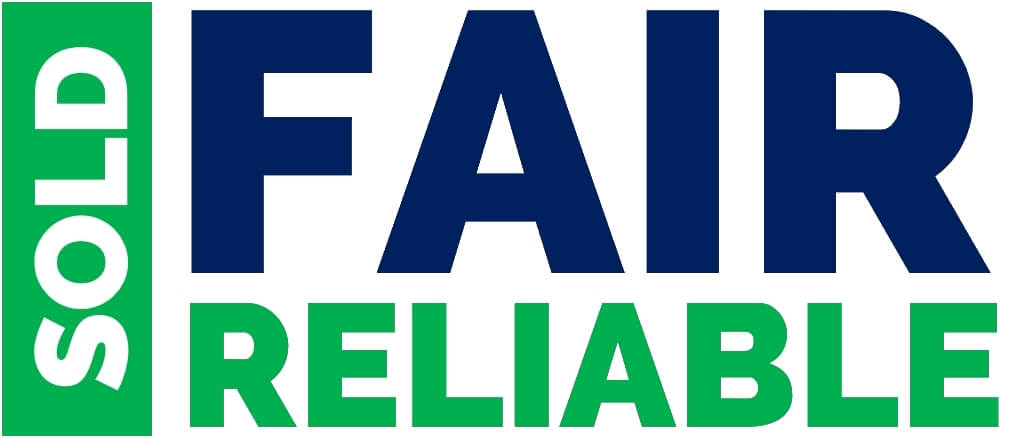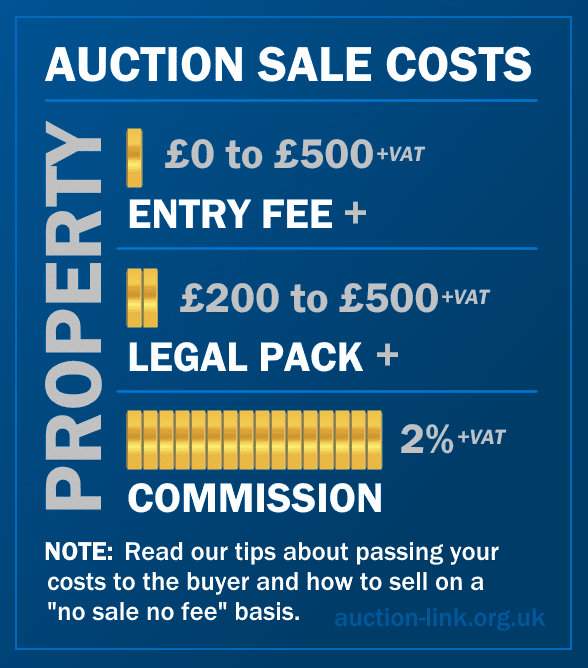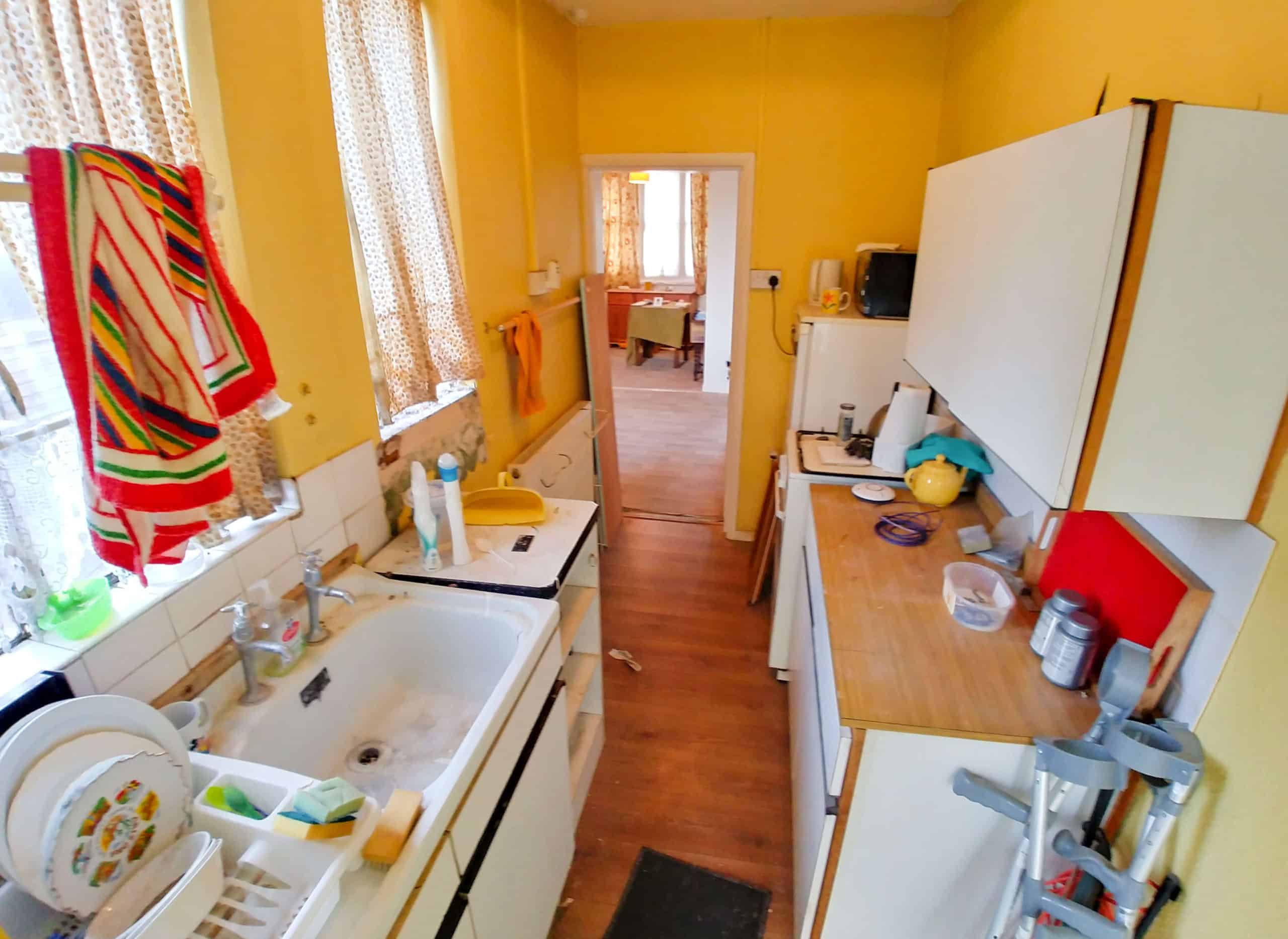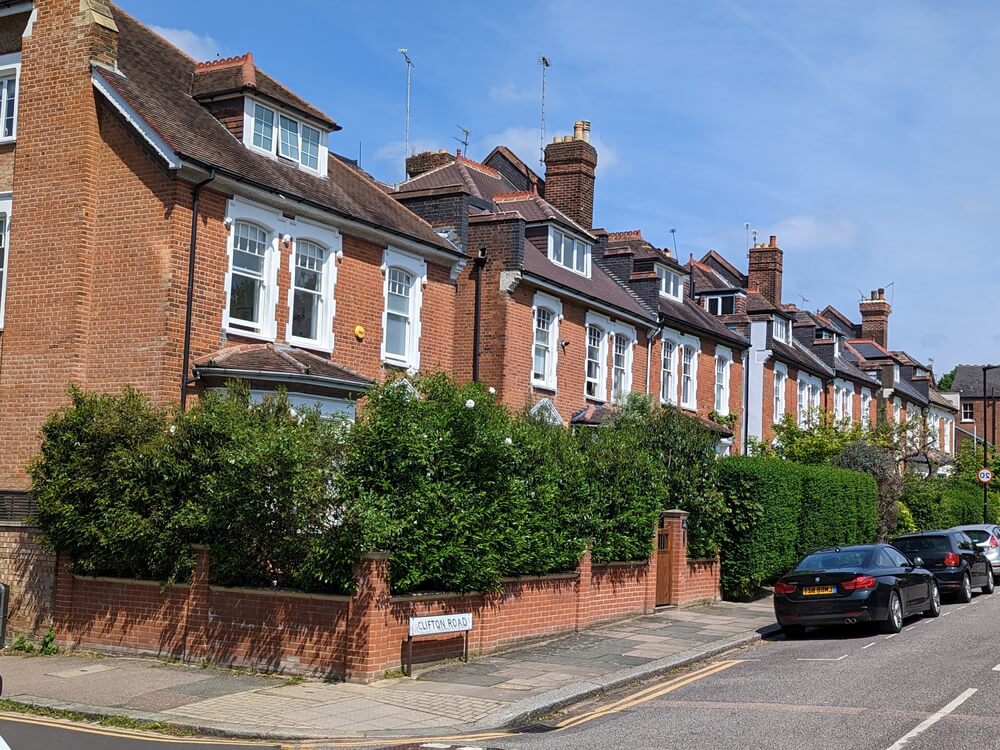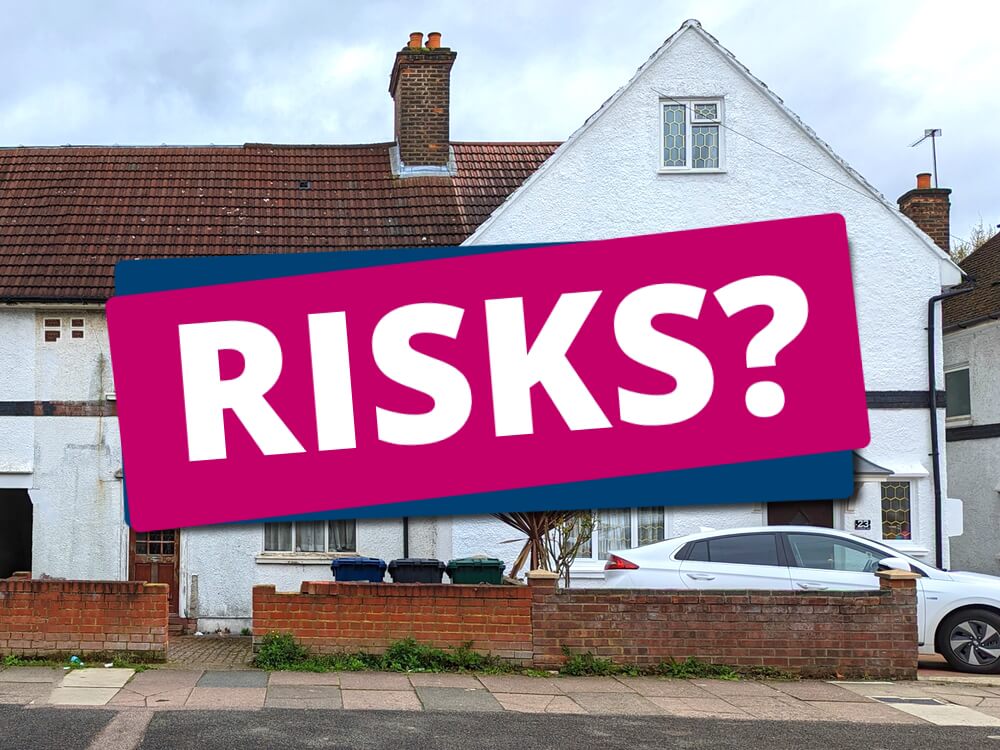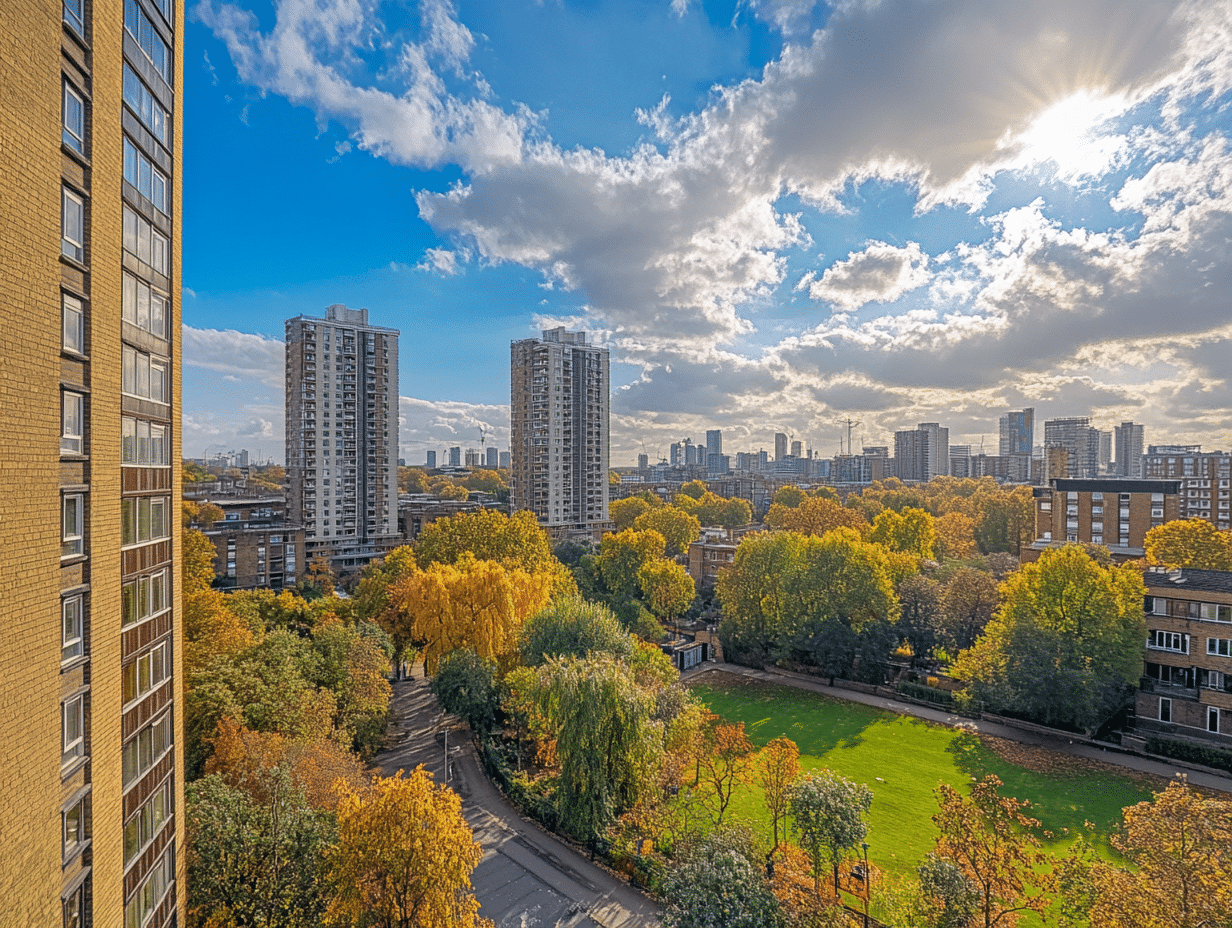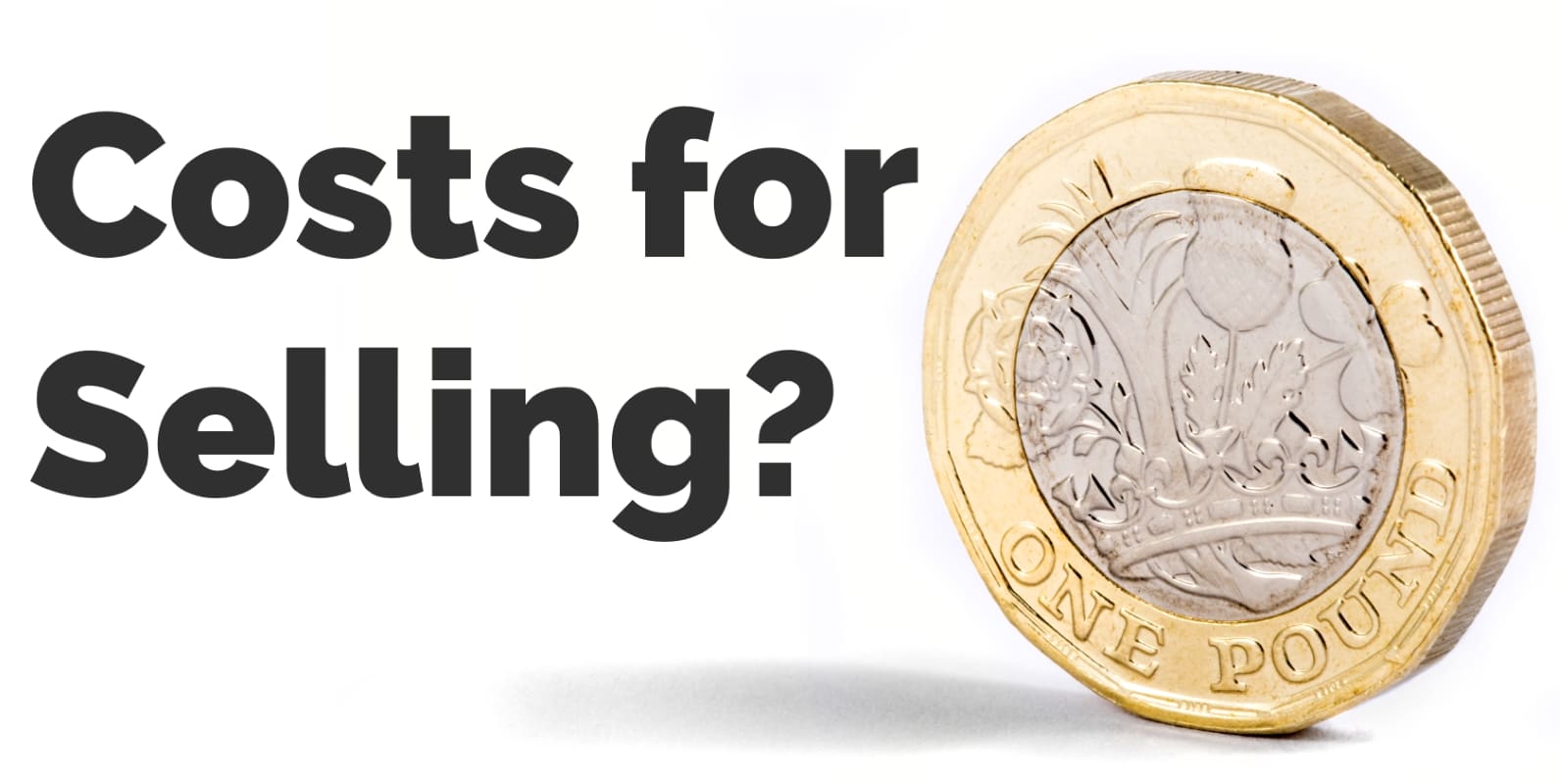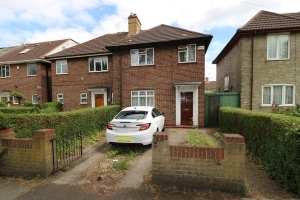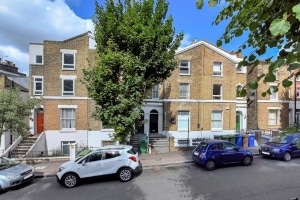Guide to Selling a House by Auction
Request a free & no-obligation auction sale price estimate
- Cost effective
No upfront fee & sell for free options - Quick
Sell your property in as little as 28 days - Secure & reliable
Legally binding sale on auction day - Fair & transparent
Sold to the highest bidder
For your peace of mind we are a member of The Property Ombudsman


Selling by auction is quick and easy. Request a no-obligation auction sale estimate for your house or flat.
- Reliable
- Fast
- Secure
Interested to learn more about the easy and efficient process of selling your property by auction?
Talk to our team on 0800 862 0206
Home: Auction Link » Guide to Selling a House at Auction (July 2025)
The marketplace for property auctions has changed dramatically in the last decade. And the range of auction services now available can make the choice a confusing task for property sellers. How do you decide on the type of auction that best suits your requirements?
Jump to section: Why sell by auction?
This guide to selling a house (or flat) by auction is intended to help property sellers decide if auction is a suitable option. And if so, what type of auction best suits their requirements.
Guide to selling a house by auction: Updated by Mark Grantham on 2 July 2025.
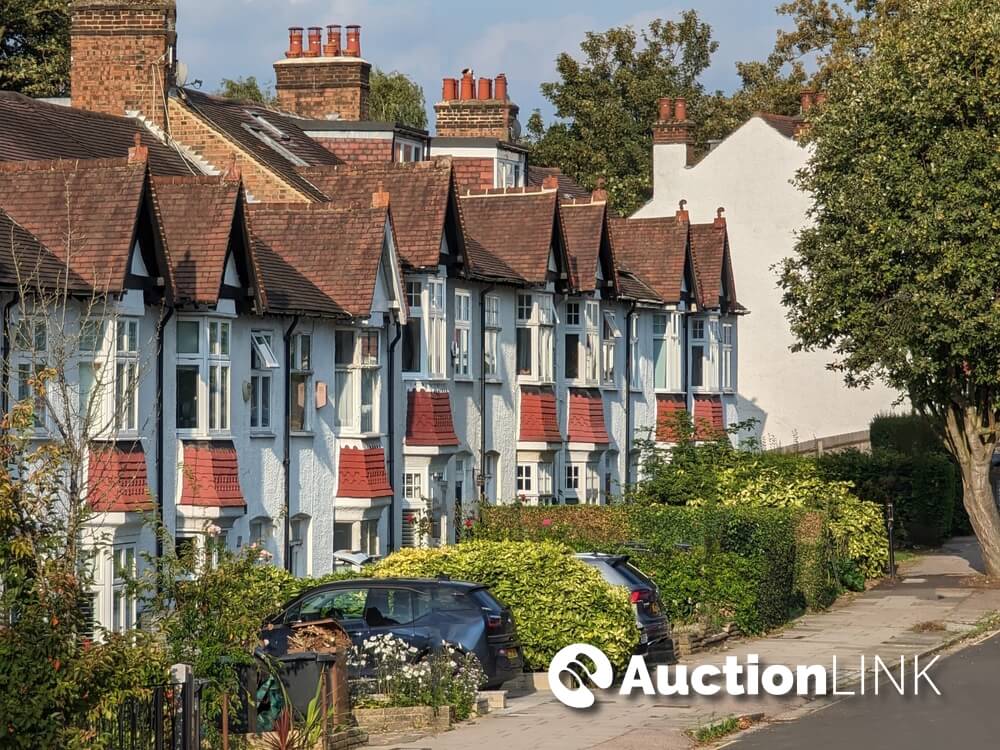
Property auctions are quite misunderstood in the UK. For most home sellers, their initial reaction to auction is that it’s “only suitable for run down properties, or desperate sellers”. The truth is that auction offers a secure and efficient method of selling all types of property; giving sellers more control of the sale, compared to an estate agency sale.
And the process for selling a house by auction is easier than most people think. In fact, by the time property sellers have been educated on the process of selling by auction, some wonder why anyone would even consider selling with an estate agent.
Property auctions have evolved to serve the more “average” house seller. Whilst the “homes under the hammer” style auctions you see on TV are style thriving, there are newer methods of auction designed to suit the requirements of most home sellers.
In this guide:
Types of property auction
Why sell by auction
Disadvantages
7 stage guide
Costs
Choosing an auctioneer
FAQ’s
Why not request a free auction valuation for your property? It only takes a minute! Or feel free to call us on 0800 862 0206 if you have any questions.

Auction sales become legally binding when the hammer falls – exchange of contracts takes place on auction day.
The article is intended as a helpful guide and is limited to providing general information and tips about selling a house by auction. Please bear in mind, the fees and terms vary by auctioneer, so it’s important that you read and understand the auctioneers terms of business before proceeding with an auction sale. If you’re not sure about anything, we recommend checking with your solicitor. And we’re happy to help if you require general information about selling a property by auction.
Short on time?
If you don’t have the time to read this article in full, we can come back to you with a free auction appraisal, to help you decide if selling by auction is a good option for you. Request a free estimate and we’ll come back to you.
Whilst the on-the-day “homes under the hammer” style of auctions are still going strong and evolving, there are newer methods of auction designed to suit the requirements of most home sellers.
We broadly categorise the two types of property auction as:
- On-the-day auction
- Extended auction
On-the-day auctions are the type of auction most people are familiar with. The type of auction you might expect to see on television! With 3 to 4 weeks of intensive marketing and a few minutes of bidding on auction day.
- Fixed timescale – bidding takes place on a set date.
- Very quick – 3 or 4 weeks of marketing and 2 to 5 minutes of bidding on auction day.
- Properties are priced to sell very quickly – a significantly below market value reserve price.
On-the-day auctions are live events and are often held in a hotel ballroom or conference room. But are increasingly held online only, where prospective buyers bid by phone or online.
Extended auctions are more like a lengthy auction, with bidding over the course of a month or longer. They can be described as a rolling auction – if your property doesn’t sell at the end of the first month of auction, the auction can be rolled on for a second month.
- Flexible timescale – a rolling auction.
- More time – bids can be placed at anytime over the course of a month, or longer.
- Properties are priced to sell promptly – a below market value reserve price.
Extended auctions are best described as a combination of an estate agency sale and an auction sale. The marketing side of the sale is quite similar to that of an estate agency sale, but the negotiation and transaction side uses the framework of an auction sale – so the property is sold to the highest bidder and the sale is legally binding on the fall of the hammer.
It’s the extended auction that’s really opened up the possibility for more home sellers to use auction, as an alternative to a conventional estate agency sale.
Extended auctions can be further divided into 2 categories: unconditional and conditional.
✔ Unconditional extended auction is legally binding. At the end of the auction, the successful bidder exchanges contracts, following the true rules of auction – the same rules as a traditional, on-the-day auction!
✘ Conditional extended auction is NOT legally binding. The successful bidder doesn’t exchange contracts at the end of the auction, instead they only pay a reservation fee and can back out of their purchase.
Throughout this article, when we talk about selling by extended auction we will be referring to the unconditional type of extended auction, where the sale is legally binding at the end of the auction.
If you’re interested in knowing more, it’s worth reading our guide to the difference between unconditional and conditional auctions.
Need help deciding? If you’re not sure what type of auction service best suits your requirements, please contact us on 0800 862 0206.
Auction overcomes many of the inefficiencies of an estate agency sale. If you’ve tried selling with an estate agent, you might be aware the law in England and Wales allows the buyer to reduce their offer at the last minute, or back out of the sale completely. This is explained further on the UK government website (the law is different in Scotland).
The reason estate agency sales fall through is because there’s nothing legally binding about the buyers offer.
The rules of an auction sale are different. Multiple buyers are invited to compete for your property, and the sold sign only goes up once you have exchanged contracts.

- Properties for sale by auction are continually marketed all the way up to exchange of contracts.
- All prospective auction buyers are invited to place their bid. No buyer is turned away.
- Auction buyers have to carry out their research and have funds in place BEFORE they place their bid.
- Competitive bidding from multiple committed buyers.
- Legally binding sale on auction day.
We’ve summarised the 7 key benefits of selling by auction as: a legally binding sale, speed, competitive bidding, reserve price guarantee, intensive marketing, high success rate and transparency. Our guide to the benefits of selling a house by auction explains these key points in more detail. And if you’re selling a flat or apartment, our guide to selling a leasehold flat provides some tips for a successful sale.
With so many benefits, why doesn’t everyone sell by auction? Unfortunately there is no perfect system, and there are a couple of catches to selling by auction; you need to be:
- A chain free seller – be able to move to your next home 4 to 8 weeks after auction day.
- Happy with the auctioneers suggested reserve price.
These two points are explained further in our guide – check these 2 points to see if auction is suitable for you? They are also covered in the next section – the disadvantages of selling a property by auction.
Free Auction Valuation
How much will your property sell for by auction? Request a free valuation and reserve price estimate for your property. In some cases we may need a few more details about your property before providing a free and no-obligation estimate.
There are some disadvantages to selling a property by auction. Although some of the risks can be managed, there are drawbacks that mean some property owners might not feel comfortable selling by auction.
1. Risk of a lower sale price?
Estate agents talk about “asking prices” and auctioneers talk about “reserve prices”.
Whilst there’s no upper limit to sale prices at auction, fortunately there is a lower limit – and that’s known as the reserve price.
The reserve price is the lowest amount your property will be allowed to sell for on auction day. It’s your bottom line price or “safety net”. Your property will not be allowed to sell for any less than the agreed reserve price. The final (and highest) sale price is achieved through transparent and competitive bidding, a feature that’s unique to auction sales.
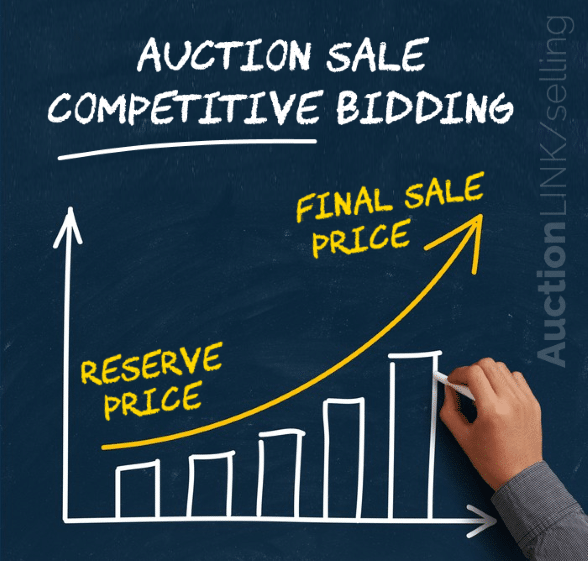
Auction: from Latin augere (“to increase“) especially in the bidding of a property sale.
- The type of property you are selling – some types of property are better suited to an auction sale (particularly the case with an on-the-day auction). The auctioneer will suggest a higher reserve price for properties that are well suited to an auction sale, as discussed later in this article.
- The type of auction – extended auction reserve prices are typically set closer to market value compared to on-the-day auction.
You will need to agree to the auctioneer’s reserve price before booking your property into auction. The reserve price won’t change before auction day, without your consent. It’s important to make sure the reserve price is high enough to cover your outstanding mortgage and other costs associated with moving home.
RISK! An unfortunate outcome would be selling for the reserve price, if you were expecting to sell for more. When bidding reaches or exceeds the reserve price on auction day, contracts are legally exchanged when the hammer strikes. Unlike a private treaty (estate agent) sale where everything is “subject to contract”, at auction the sale is legally binding – sold means sold. The buyer can’t back out of the transaction and neither can the seller.
2. No backing out
To sell your property by auction, you need to be a chain-free seller. In other words, your next home will need to be ready to move in to fairly quickly. Not immediately, but within 4 to 8 weeks after auction day.
The reason you need to be chain-free is because auction sales are legally binding; the buyer cannot back out of their purchase. But likewise, the seller cannot back out of their sale.
If you’re selling a vacant property, that’s ideal. And tenanted properties are fine too, as the tenancy agreement can be transferred to the new owner.
3. Costs more than an estate agent
The costs for selling a property by auction vary; some auctioneers offer a “no sale no fee” service, and some offer to “sell for free”.
Some auctioneers offer a “sell for free” service, with no upfront fees and the commission is paid by the buyer.
On-the-day auction
The overall cost of selling a property at an on-the-day auction is slightly more / comparable to the cost of selling through a traditional high street estate agent. The main cost is the auctioneers commission, which is typically in the region of 2% to 3%+VAT only payable upon successful sale. Some auctioneers also charge an upfront catalogue/entry fee of a few hundred pounds, although it may be possible to postpone payment until after the auction, only payable upon the successful sale of your property.
The cost of preparing a legal pack for auction can vary depending on the complexity of the property, location, and the solicitor (or conveyancer) used. On average, you can expect to pay £200 to £500 – though some providers may charge outside this range depending on the specifics of the property.
Extended auction
The cost of selling at an extended auction is higher, but paid by the buyer. The market rate for selling by extended auction is between 3.5% to 5% + VAT paid by the buyer, along with their deposit on exchange of contracts. The buyer will obviously account for these costs when they bid. But for the seller, the amount you’re offered (the top bid) will be the amount you receive, without any deductions, apart from your solicitors fees.
Some auctioneers offer to prepare the auction legal pack for no upfront cost – only payable when the property successfully sells.
4. Risk of not selling?
Auction is one of the most reliable methods of sale available. Approximately 80%+ of properties that are entered into auction will go on to successfully sell. But still, we’re frequently asked what happens if my property doesn’t sell at auction? It’s one of the the top 5 questions asked by home sellers.
On-the-day auction
If bidding fails to reach the reserve price at an on-the-day auction, the auctioneer will try to secure a sale as soon as possible after the auction. In some cases that might be within a few minutes of bidding ending. If a sale cannot be concluded on auction day, the property will be advertised as “available” and the auctioneer will continue to advertise the property on the portals (e.g. Rightmove and Zoopla) for a period after the auction.
If the property doesn’t sell soon after the auction, the auctioneer will invite you to enter the property into their next auction (most auctioneers will not charge you an additional entry fee for this). Sometimes properties just need a bit more time on the market, so you should stand a better chance of selling next time around.
There is no commission to pay if the property doesn’t sell with the timeframe you have agreed with the auctioneer. But just like most estate agency agreements, if you later sell to a buyer who was introduced by the auction company within their appointed timeframe, you may be liable to paying the auctioneers commission.
Extended auction
The process is different for an extended auction. If bidding doesn’t reach the reserve price by the end of the first auction cycle (a cycle is typically one month), the auctioneer will roll the auction on for a bit longer. There is no loss of momentum from the marketing, the auction end date is simply changed to a future date. The idea is that you sell within the first month or two, but the auction can continue rolling on for longer if needed.
5. Reduced audience of buyers
Who will the likely buyer be? Although there are big incentives for buying though auction; (1) the possibility of buying a property below market value, if the prospective buyer is not outbid (2) a quick purchase and (3) the legal pack provided to the buyer for free. Not every buyer feels comfortable with the speed and definiteness of auction. Some buyers prefer the slower, more cautious process of buying through an estate agent.
That is certainly the case with an on-the-day auction – the audience of buyers are generally the trade end of the market, with only a small proportion being owner-occupier buyers. Extended auctions have a longer bidding period and are considered a more “consumer friendly” auction, the additional bidding time has the effect of broadening the audience of buyers, to include more end-user / owner-occupier buyers, compared to an on-the-day auction.
If you’re considering selling your house at auction, the first step is to familiarise yourself with the process and determine whether auction is a suitable option for you. To help you understand the process of selling a property at auction, we’ve provided a step by step 7 stage guide along with an 8 minute video guide to selling a house by auction.
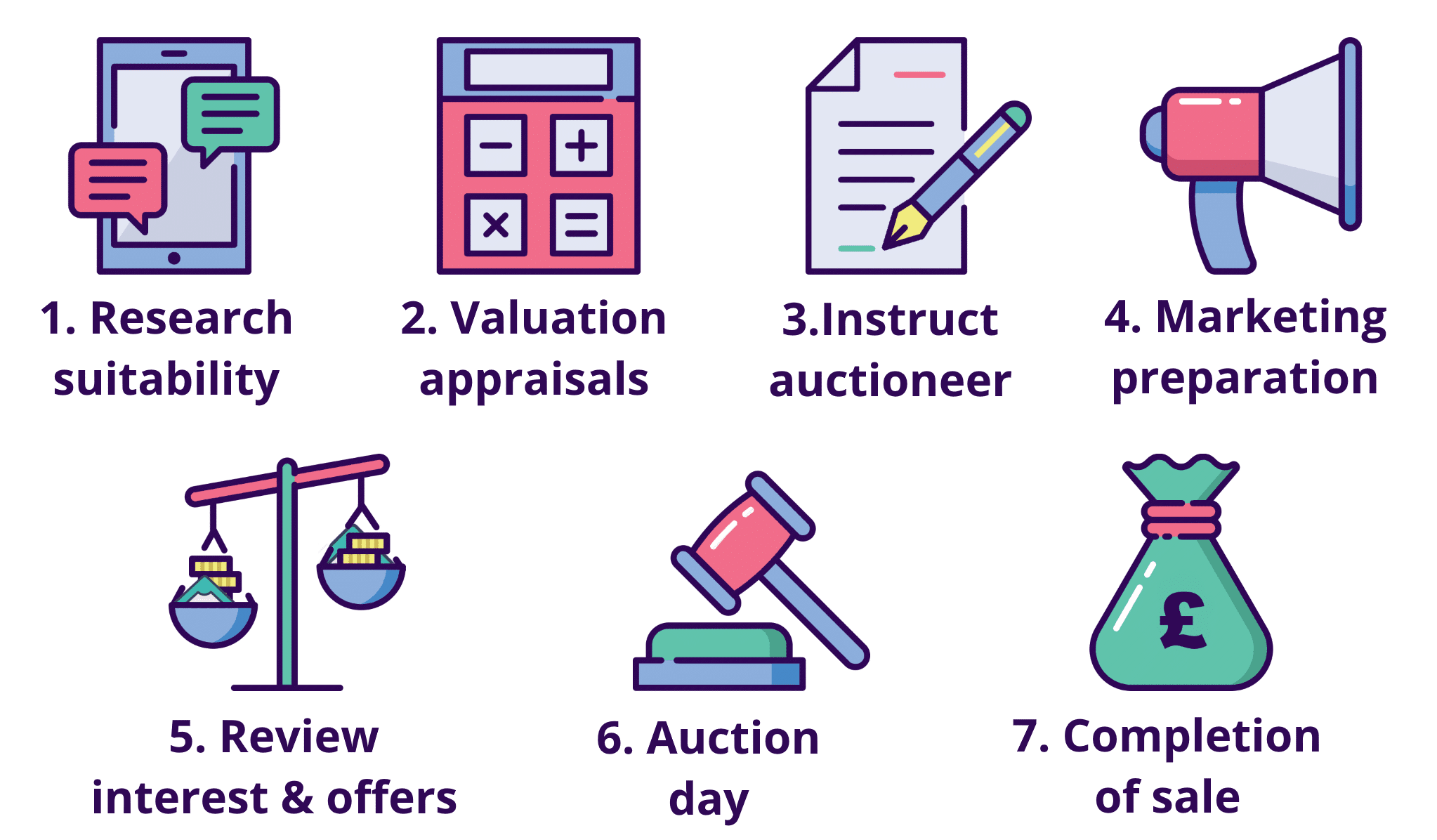
- 1) Research suitability
- 2) Valuation appraisals
- 3) Instruct the auctioneer
- 4) Marketing & preparation
- 5) Review interest & offers
- 6) Auction day
- 7) Completion of sale
Does the speed and definitiveness of an auction sale suit your circumstances, or do you require more flexibility? Think about the price you need to achieve, can you risk selling for the reserve price? There are a range of different auction options available, so it’s worth spending some time considering what type of auction best suits your personal circumstances and property type. Contact us to discuss your options.
There are hundreds of auctioneers in the UK and an increasing range of online auctions to choose from. Ask the auctioneer to appraise your property; they will suggest an auction reserve price (the minimum price your property will be allowed to sell for) and details of their costs. Ask the auctioneer to provide you with examples of recent sales for properties similar to yours. Find out what price those example properties actually sold for at auction.
Contact us for a FREE auction appraisal.
Once you have narrowed down your choice of auctioneers, consider the timescales you need to work to. You will usually need to book into auction 3 to 4 weeks before auction day. Booking into auction is easy, you will just need to sign and return the auctioneers terms of business. You will need to find a solicitor to help with the sale.
There are 2 areas of preparation before auction day. Firstly your solicitor will need to prepare the auction legal pack; you will need to respond promptly to any forms they ask you to complete. Secondly the auctioneer will carry out the marketing, which includes advertising the property and conducting viewings.
The auctioneer will provide you with feedback on the level of interest to help you make a decision on whether to accept an offer before auction day e.g. number of viewings, number of legal packs downloaded and number of buyers registered to bid (including telephone bidders and proxy bidders). In most cases it’s best to allow prospective buyers to compete for a property in the room – that’s how you can be sure of achieving the top price. However, if your circumstances mean that you have a strong preference of securing a sale before auction day, you will have that option.
On auction day buyers will compete to purchase your property – the only way a buyer can secure your property is to be the highest bidder. Bidding for each auction lot usually lasts about 2 or 3 minutes. When bidding meets or exceeds the reserve price you know you have sold! On auction day the winning bidder exchanges contracts and pays a 10% deposit, for completion of sale 28 days later. You don’t need to attend the auction, neither does your solicitor, but it can be an exciting experience and worth doing if you are able to.
In the days or weeks after the auction solicitors will finalise the transaction. Completion usually takes place 28 after but can be sooner if the buyer and seller are happy to do so. You will need to make sure you have moved out of the property and are ready to hand over the keys on completion day. Your solicitor will receive full completion funds from the buyer and transfer the proceeds of sale to your bank account.
Video Guide: Selling a House by Auction
TIP If an auction company is suggesting an unrealistically high reserve price and requesting payment of an upfront fee to book your property into auction, we suggest being wary. Paying fees without a realistic prospect of selling your property is something to be avoided!
Auction costs are higher compared to selling through an estate agent. The table below provides a cost comparison for selling with an estate agent, extended auction and on-the-day auction.
Costs stated are an indication only and will vary by auction company and solicitor. All amounts stated are exclusive of VAT. Fees for estate agents refer to full service / conventional high street estate agents, rather than online agents.
1. Upfront entry fee
On-the-day auctioneers do usually charge an upfront/entry fee, but extended auctioneers do not.
Estate agent
While some high street estate agents charge upfront fees, these are typically limited to optional extras, such as premium listings on Rightmove, virtual tours, or additional marketing services. In most cases, high street estate agents do not require upfront payments.
On-the-day auction
On-the-day auctioneers typically charge an upfront fee for several reasons. For instance, many produce a catalogue that is widely distributed or mailed to prospective buyers, with the upfront fee helping to cover these costs. Additionally, on-the-day auctioneers often outsource property viewings to third-party providers, which can cost the auctioneer around £50 per viewing slot, with 4 or 5 slots typically arranged per property.
The £400 upfront entry fee we mentioned for on-the day auctions may increase if the seller opts for additional marketing services. For example, sellers requesting a full-page listing in the auction catalogue, rather than the standard one-third page, will incur an extra charge.
Extended auction
For the extended auction, there are no upfront fees. Much of the sales and marketing preparation is carried out in collaboration with their local partner estate agent, who is compensated through the “buyer’s premium,” as detailed below.
2. Cost (commission)
The largest expense when selling a property is typically the commission, which is usually calculated as a percentage of the final sale price. However, for lower-value properties, a minimum fee often applies. For instance, if an auctioneer or estate agent charges 2% + VAT for a property sold at £10,000 (such as a garage), their fee would amount to just £200 + VAT. Minimum fees for auctioneers and estate agents generally range from £1,000 + VAT to £5,000 + VAT.
Estate agent
Estate agents typically charge around 1% to 2% + VAT for sole agency agreements, but this rate can rise to as much as 3.5% + VAT for joint or multiple agency arrangements. In a joint or “multi” agency setup, multiple estate agents are appointed to sell the property, and the commission is paid only to the agent who successfully finds the buyer and completes the sale.
Auctioneers will only work on a sole agency basis, because they want all enquiries funnelling through the auction process. If the property is also listed with a competing estate agent, it could very easily disrupt the marketing effort of the auction sale. The exception here is that for an extended auction, the auctioneer will appoint a partner estate agent to help with the marketing and viewings, the seller doesn’t pay anything extra for that, their service will be included in the fee.
On-the-day auction
The commission charged for an on-the-day auction will usually be in the region of 2% to 3% + VAT, only payable upon successful sale. In some cases, the auctioneer may be open to reducing the commission rate for higher value properties, if the seller is agreeable to a lower reserve price.
Extended auction
For an extended auction the commission rate is typically between 3.5% to 5% + VAT and this is charged to the buyer, rather than the seller. Auctioneers will often refer to the commission as a “buyers’ premium” or reservation fee. The sales and marketing will include the services of a local estate agent, and their fee is paid out of the buyer’s premium.
3. Who pays the costs
With permission from the auction company, it is possible to pass costs to the buyer for on-the-day auction, by inserting a clause in the special conditions of sale (a document in the auction legal pack). With an extended auction this is done as standard. When the buyer pays the fees, they will need to account for this when they bid. When the seller has passed their fees to the buyer, the amount the seller is offered (the top bid) is the amount they will receive, without deductions.
4. Buyers administration fee
On-the-day auctioneers don’t just charge the seller. They charge the buyer too, but it’s only a relatively low cost. The buyers administration fee (sometimes called a contract documentation charge) is an additional cost paid by the successful bidder. The cost to the buyer is typically no more than around £1,000 + VAT.
With an estate agency sale, the buyers solicitor will verify identification documents, manage exchange of contracts and handle client money. But with and auction sale, the auctioneer does this job on behalf of the buyer and the seller. The buyers administration fee is a contribution towards the cost of that work.
5. Auction legal pack
Both on-the-day and extended auction sales require an auction legal pack to be prepared by the sellers solicitor. An auction legal pack is likely to cost no less than about £200 to £500 + VAT. The lower end of the range being for the sale of a small plot of land or a freehold garage. A solicitor is likely to charge a higher rate for more complex sales, such as a commercial property or a leasehold flat.
6. Total solicitors fees
Solicitor’s fees for an auction sale will be comparable to that of an estate agency sale. It’s worth noting that solicitors sometimes charge abortive fees if a falls though. So, if you’re considering selling your property by auction because your estate agency sale has fallen through, check if the documents from your aborted sale can be re-used for the auction legal pack. If your solicitor can re-use the same documents it will help to keep your costs down.
For more information about the costs involved with selling a house or flat by auction, please see our guide to the costs for selling a property by auction.
Before making enquiries with an auction company, we recommend taking the time to read this article from the beginning. This will help you better understand if auction is the right choice for you. There are some risks associated with selling a property by auction that make it an unsuitable option for some property sellers.

Some on-the-day auctions are still conducted “in the room”, but they are increasingly being held as live online events.
The next stage is to decide on the type of auction, the choice between on-the-day auction or extended auction. Again, reading through the sections above will give you a better idea of what type of auction best suits your circumstances.
IMPORTANT! Not all types of auction are legally binding on the fall of the hammer.
Earlier in this article, we outlined the two types of extended auction: conditional and unconditional. To recap, only the unconditional extended auction is legally binding when the hammer falls.
While the conditional auction certainly has its place, we find that most property sellers we work with tend to prefer the unconditional auction.
The final stages are shortlisting and deciding on the auction company you wish to appoint. In this section we offer some guidance on what to consider when choosing an auction company to sell your house.
If you need help creating a shortlist of auction companies, we recommend searching online for property auctioneers in your area, or using one the property portals e.g. Rightmove or Zoopla, to find active auctioneers in your area. For example:
Go to rightmove.co.uk
1) Enter a search term e.g. “London” or “SW19”
2) Click “for sale”
3) Tick the box “Include Under Offer, Sold STC”
4) Click “find properties”
5) On the menu bar at the top right of the page, click on the “filter” tab.
6) Click “auction property” and then done.
The results should show property auctioneers that are active in your area. When scrolling through the list of properties for sale (or recently sold), take a note of the name of the auction company, and add them to your list. If you can’t see any results, you might need to extend your search radius. To do this, find the dropdown box at the top of the page with the prefilled criteria: “+0 miles”. Selecting a broader area e.g. 1 mile or 5 miles should bring up some results.
We have provided a list of London property auctions (including future auction dates) on our website. If you’re selling a property that’s not located in London, it’s still worth considering a London auction company, as most will cover a much broader area; either England and Wales, or all of the UK. Most London property auctioneers might better be described as “London based, national auctioneers”.
List of London property auctioneers.
Need help deciding? If you’re not sure what type of auction service best suits your requirements, please contact us on 0800 862 0206.
If you can’t find the answer to your question below, you might like to check our selling a property by auction – FAQ’s page, or please feel free to contact us.
Almost any kind of property can be sold at auction, regardless of whether it’s in good or poor condition. In many cases, it’s not the property’s condition or type that drives the decision to sell at auction, but the seller’s circumstances. Auctions are particularly well-suited to those who need a fast and dependable sale.
The misconception that only properties in poor condition should be sold at auction comes from the fact that properties in poor condition achieve higher sale prices at auction compared to an estate agency sale. It’s not a good idea to sell a poor condition property with an estate agent, because buyers are able to chip away at the price stage after stage; offers are reduced after the survey, or after a builder/roofer/electrician has quoted for work that needs doing.
Auction is different, buyers do not have the opportunity to reduce their offer, with an auction sale the price can only increase, the emphasis is on the potential for the property, not the problems.
Yes, you can. There is no legal reason why you can’t sell your house by auction if you have a mortgage outstanding on your property. However, you will need to make sure the outstanding mortgage (redemption) amount can be paid off from the proceeds of sale.
The big difference between the sale prices achieved at auction compared to estate agency sales is the direction of negotiation.ᅠ As the diagram below illustrates; estate agents start with a high “asking price” and in most market conditions (apart from an exceptionally booming market) the asking price will decrease over time and will be further negotiated down by the one and only selected buyer.ᅠ An auction sale is different, the price starts low and can only increase over the course of competitive bidding.
One of the benefits of selling your house at auction is that you’re not setting an upper limit to the sale price, this often leads to sale prices well above expectations!
Not setting a firm expectation on price (asking price) makes properties with potential for improvement ideal for auction; competitive bidding between multiple buyers ensures a property finds its top price as the true value and potential of the property is revealed. Compare this to an estate agency sale, where the one and only selected buyer is perfectly entitled to reduce their offer amount for any reason at all (usually after a survey) often with cooperation from the estate agent who is eager to secure a sale at any price, so they can earn their commission.
Auction versus estate agent sale prices
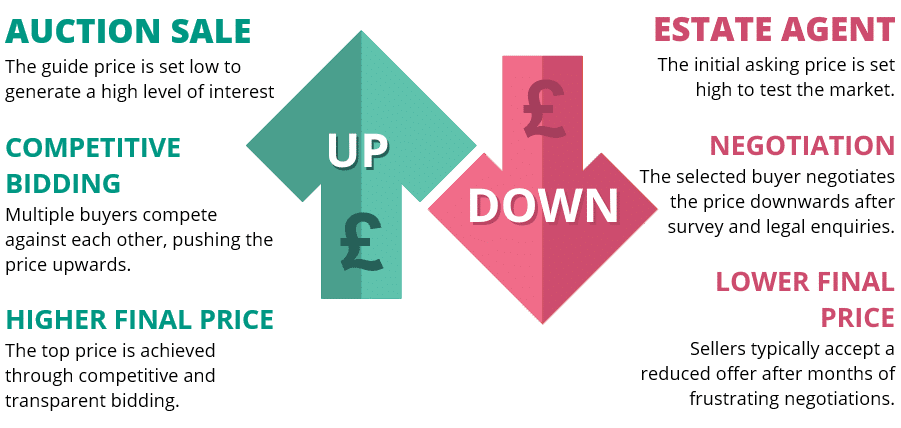
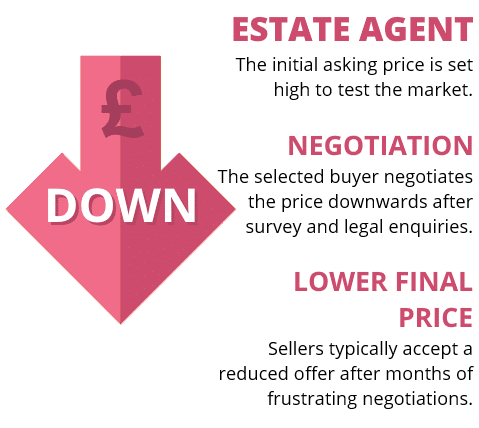
With an estate agency sale the asking price starts high and decreases over the course of negotiations. But with an auction sale the price starts low and increases over the course of competitive bidding between multiple buyers.
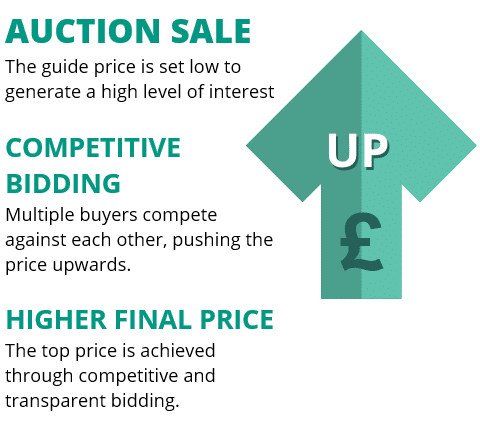
With an estate agency sale the asking price starts high and decreases over the course of negotiations. But with an auction sale the price starts low (the reserve price) and increases over the course of competitive bidding between multiple buyers.
Find out more about auction reserve prices and why they’re so important!
Allowing multiple bidders to compete for your property not only helps to achieve a higher sale price, it also helps towards ensuring a reliable sale. Estate agency sales are prone to falling through because the one and only selected buyer is quite within their rights to back out of the sale at any time up to the point of formal exchange of contracts.
The reserve price should not be confused with the guide price. The auction guide price is the amount a property is advertised for. It’s typically set below the reserve price to stimulate interest amongst prospective buyers and encourage bidding. Getting more people through the door converts to more bidders on auction day, helping to ensure a successful sale.
The timescale for selling at auction is 6 to 8 weeks, that’s from the time of booking into auction until completion of sale.
Before auction day: Auctioneers set their deadline for entries about 3 or 4 weeks before auction day. To book into auction you will simply need to sign and return the auctioneers terms of business. Some auctioneers will also need to see copies of ID and proof of address e.g. a copy of a driving licence or passport and a utility bill.
Once the terms of business have been received by the auctioneer, it’s a step-by-step process to auction day. The auctioneer takes care of the market and viewings. And your solicitor will take care of the legal side of things. The seller doesn’t have to do all that much, except respond to their solicitors’ enquiries. Selling at auction is very easy.
On auction day: The buyer signs a legally binding contract and pays a 10% deposit on auction day. Contracts of sale are legally exchanged. At this stage neither the buyer or seller can back out of the sale. At auction, sold means sold.
After auction day: The standard timescale for completion (when the seller moves out of the property, hands over the keys and receives funds from the sale) is 4 weeks from the date of the auction. However, if both the buyer and seller are ready to complete sooner, that can be arranged. For some sellers a 4 week completion is not long enough to arrange removals and move out of the property. The timescale for completion can be extended for a longer period by adding a clause to a document called the Special Conditions, which forms part of the auction legal pack. This will need to be done before auction day. If needed, it’s not unusual for the completion date to be set 6 weeks or 8 weeks after auction day, giving the buyer and seller more time between exchange and completion.
Read our full guide to the auction sale process for a step-by-step guide to the timescales of an auction sale.
Yes, you will need to appoint a solicitor to help with preparation of the auction legal pack and conveyancing. Most property solicitors will be very happy to help with an auction sale. Your solicitor will not be required to attend the auction on auction day.
Some sellers prefer the reassurance of securing a sale before auction, rather than waiting for auction day. If you decide to accept an offer before auction day the auctioneer will arrange for the buyer to pay a 10% deposit and exchange contracts for a legally binding sale.
The auctioneer will provide you with feedback on the level of interest to help you make a decision on whether to accept an offer before auction day e.g. number of viewings, number of legal packs downloaded and number of buyers registered to bid (including telephone bidders and proxy bidders). In most cases it’s best to allow prospective buyers to compete for a property in the room – that’s how you can be sure of achieving the top price. However, if your circumstances mean that you have a strong preference of securing a sale before auction day, you will have that option.
Ready for auction?
Request a free valuation and reserve price estimate for your property today. In some cases we may need a few more details about your property before providing a free and no-obligation auction sale estimate.
Need help selling your home? Call 0800 862 0206 or send us an enquiry online.
Royal Institute of Chartered Surveyors (RICS)
RICS enforce professional standards for property auctioneers – they publish the “Common Auction Conditions” that RICS members must comply with.
Estate Agents Act 1979 – UK Government
Just like estate agents, property auctioneers have to follow certain statutory regulations, including the Estate Agents Act 1979.
Dealing with property auction issues – Cunningtons LLP
The “buyer beware” principle doesn’t mean that sellers don’t have an obligation to be accurate in the information they provide about a property.
Pros and cons of selling by auction
Auction provides a quick and reliable method of sale, but there are some risks involved for the seller. This article explains some of the benefits and disadvantages of selling by auction.
Carry out improvements before selling?
When selling a property in need of improvement, should I spend money on refurbishment works? Or leave the property as is, and let the new owner take care of improvements?
Poor condition property: auction Vs estate agent
The private treaty method of sale isn’t suited to some types of property – it’s inefficient and potentially open to abuse.
Selling a house in poor condition
The rules of an auction sale mean that buyers must compete to purchase a property. And the highest bidders offer is legally binding – there is no opportunity for them to reduce their offer.
Can houses in good condition be sold at auction?
Long gone are the days when auction was only suitable for run-down or unmodernised properties. An extended auction offers an efficient way to sell houses an flats in good condition.
What are the disadvantages of selling by auction?
There are some risks and disadvantages in selling by auction. If you’re new to the idea of selling your home by auction, this article might help you decide if auction is suitable (or not) for you.
Selling a short lease flat
Short lease flats typically need to be sold to cash buyers. Recent changes to the law mean the buyer doesn’t have to wait for 2 years to extend the lease, which can make the process for selling much easier.
Property auctions offer an ideal route to a quick and reliable sale. Our guide to selling at auction is intended to provide you with a quick start to understanding the basics of selling a house or flat at auction.
Prefer to talk?
Need help deciding if auction is right for you? Callᅠ0800 862 0206ᅠor request a call back for later.
